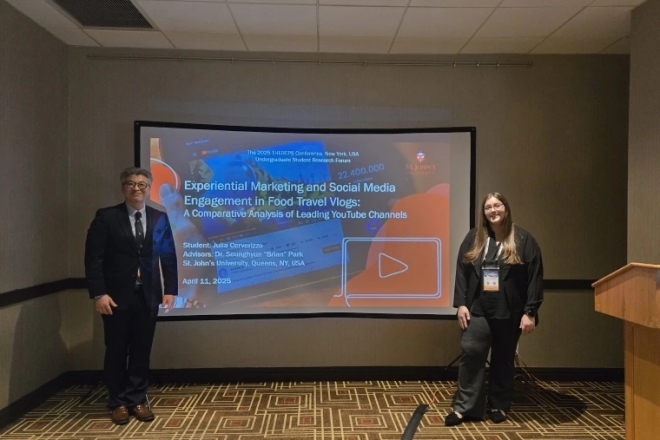

CCPS: Student Research
💡 Get Involved in Student Research at CCPS
At the Collins College of Professional Studies, student research is at the heart of innovation and discovery. Whether exploring new ideas in technology, business, media, or the humanities, CCPS students have the opportunity to collaborate with faculty mentors, present at conferences, and publish their work in academic journals. These experiences not only strengthen critical thinking and problem-solving skills but also prepare students for graduate study and successful careers. We encourage all students to get involved in research—whether by joining a project, starting one of your own, or sharing your work through CCPS events and publications.
🌟 Featured Story

Hospitality Management Major Wins Best Paper Award
Julia Cerverizzo, a Hospitality Management major earned the Best Paper Award at the 2025 Tourism, Hospitality, and Event Conference in New York City for her research on experiential marketing and social media engagement in food travel vlogs. Guided by her faculty mentor, Seunghyun “Brian” Park, Ph.D., Julia impressed judges with her ability to connect academic concepts to real-world applications, a skill that underscores the program’s focus on preparing students to innovate in the industry.
🚀 Ways to Get Involved

Scholarium
Scholarium is a peer-reviewed, open access academic journal managed by students and guided by faculty at St. John’s University’s Lesley H. and William L. Collins College of Professional Studies (CCPS). Dedicated to publishing innovative empirical, theoretical, and review articles on human rights, civil rights, and social justice, the journal encourages interdisciplinary dialogue and diverse perspectives. Rooted in the University’s mission to educate global citizens and leaders, Scholarium reflects CCPS’s commitment to integrating theory with practice, fostering critical thinking, and preparing students to address pressing societal issues in a multicultural and interconnected world.

The Legal Apprentice
Students from all disciplines at St. John’s University are invited to publish their work in The Legal Apprentice, an undergraduate journal created and edited by Mary Noe, J.D., Professor of Legal Studies. The journal features well-written, engaging articles on diverse topics—from endangered species to ballot selfies—authored by undergraduates through a blind review process. No legal training is required, as the focus is on strong writing rather than legal expertise. Each issue also includes a note on writing from a distinguished member of the legal profession, with past contributors including federal and state judges as well as St. John’s Law faculty. Students interested in contributing should contact Professor Noe at [email protected].

Graduate Assistants
The Lesley H. and William L. Collins College of Professional Studies offers assistantships and doctoral fellowships to graduate students recognized for their academic achievement and potential as creative scholars. Graduate assistants support faculty and administrators through research, collaboration on presentations and publications, and assistance with College events.
📖 Previous research conducted by CCPS students are below.
The IAEM Region #2 newsletter (Fourth Quarter 2023) contains contributions from (2) of our Homeland Security, Doctor of Professional Studies students: Shayla Clarke & Michael Etzel.
Click here to read more about their contributions.
Dr. Erald Troja, coordinator of the Cybersecurity program and the Cybersecurity Center of Academic Excellence, along with Computer Science Associate Professor Dr. Nikhil Yadav and fourth year Cyber Security Systems student Laura M. Truong ’22CCPS, had their joint paper, “Personalized Outsourced Privacy-Preserving Database Updates for Crowd-Sensed Dynamic Spectrum Access” accepted for publication in the highly rated IEEE MELECON22 interdisciplinary international flagship conference.
Click here to learn more their research as well as other papers published from CCPS Faculty in the Department of Computer Science, Math and Science.
Computer Science graduate student Christopher Singh, along with Professor Nikhil Yadav's research paper was accepted to the HICSS (The Hawaii International Conference on System Sciences 2022). This is a premier conference in Information Systems, the Sciences, and IT management. The project was a 6-7 month internal research effort where they looked at building a machine learning infrastructure to study mental health in NY during COVID-19’s first wave.
Joshua Peguero, a first-year Computer Science major in The Lesley H. and William L. Collins College of Professional Studies, recently presented his research at the 39thAnnual Association for the Advancement of Artificial Intelligence Conference on Artificial Intelligence (AAAI-25) in Philadelphia, PA.
Click here to read the full article.
